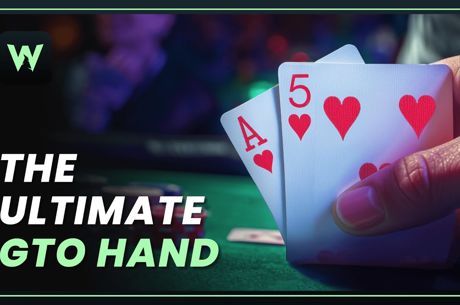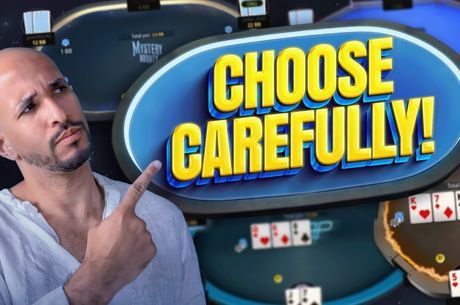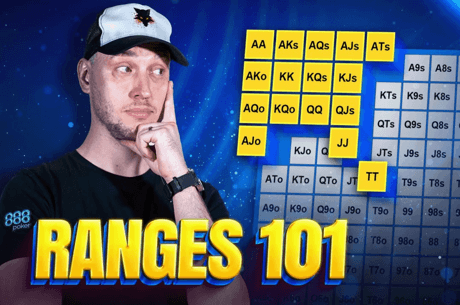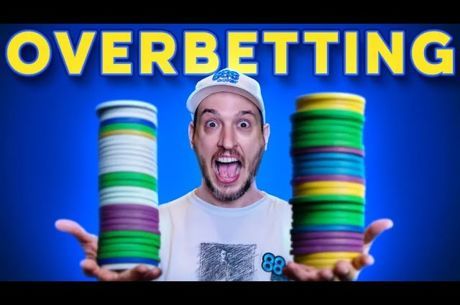Hand Review: How Hellmuth Talked Polk Out of Paying Him $90,000

Table Of Contents
One of the most talked-about hands of the early part of 2021 took place last week on "High Stakes Poker." Some called it the greatest fold in the history of the show.
At their essence, many folds are exercises in great discipline and hand reading skills. This one, however, was a bit different. This one came down to one thing: table talk. And it wasn't the experienced live pro talking his way into the correct play. Instead, the tables turned as the online legend used table talk to outwit the man ostensibly far more comfortable live.
Here, we'll take a look at how that happened and what lessons can perhaps be learned.
The Hand
The whole thing is just really great theater, so rather than describe the hand in full detail, I'll just leave this video, which comes courtesy of the YouTube channel.
For those who for whatever reason can't play the video, here are the cliffs:
Hellmuth opened third to act for $1,100 with Q♠10♥. James Bord called on the button with 2♥2♣. Polk came along from the big blind with 10♦7♣. On the J♠9♠8♥ flop, Bord bet $2,000, Polk made it $7,000, Hellmuth shoved all in for $97,200. After extensive table talk between the two, Polk found a fold.
"What Could You Easily Have?"
Polk wasn't shy about his initial instinct, saying he was almost certainly calling but wanted the count just in case. Luckily for Polk, this wasn't an online hand with a short time bank. He realized he had some time and decided to use it, just in case he could figure anything else out that would help his decision.
Hellmuth initially let Polk muse on his own. Then, he decided he could try to prod him toward a call by responding. The key part of the exchange happened right when Polk announced he was considering a huge laydown. Perhaps sensing his chance of a call slipping away, Hellmuth acted.
"I mean, I could easily have...you know...," he trailed off.
"What could you easily have?" Polk responded with a look of skepticism. "You just bet a lot into very, very little."
"I could have a set."
"Could you have a set? I don't think you could have a set here. C'mon Phil, you're better than that."
"I could have the blockers, two tens."
That was the last straw for Polk, whose skepticism reached its peak, and he said he was leaning toward a fold. In a last ditch effort, Hellmuth said he could have the ace-ten of spades.

How Does Ten-Seven Do Versus Hellmuth's Range?
Obviously, Polk had the second nuts. The question is, how does the second nuts do against Hellmuth's range in this spot?
There was just shy of $13,000 in the middle when Hellmuth made his shove for just over $97,000. That means Polk needed 45% equity to break even on the call.
Thanks to , we can check a few different ranges.
One hand Polk seemed sure was in Hellmuth's range was queen-ten. Certainly suited, maybe unsuited, though it's not a given he'd open that hand with several players still to act. Perhaps he could also have ten-seven suited. Finally, it's possible he could have a set, though Polk seemed to think otherwise.
Here's a look at how Polk's hand does against some ranges:
| Hellmuth Range | Polk Equity |
|---|---|
| Queen-Ten suited, Ten-Seven suited, A♠10♠, A♠Q♠ | 29.94% |
| Queen-Ten suited, Ten-Seven suited, A♠10♠, A♠Q♠, JxJx | 40.3% |
| Queen-Ten suited, Ten-Seven suited, A♠10♠, A♠Q♠, JxJx, 9x9x, 8x8x | 48.82% |
| Queen-Ten suited, Queen-Ten offsuit, Ten-Seven suited, A♠10♠, K♠10♠, K♠Q♠,A♠Q♠, JxJx, 9x9x, 8x8x | 35.02% |
The only situation in which Polk has enough equity to call is if Hellmuth will shove all sets, straights, and ace-high combo draws. Even expanding the range to include more combo draws along with the unsuited queen-ten combos, though, drops Polk's equity back well below the calling threshold.
If Polk's instinct is right and Hellmuth doesn't have sets, he's got a clear-cut fold, as crazy as that may sound with the second nuts.
Trapping Himself With His Words
While the hand could potentially be a close decision depending on how Polk sees Hellmuth's range, one factor clearly pointed him in the right direction: Hellmuth's table talk. While Polk is a math-oriented player who has made known in the past his disdain for trying to deviate too much from fundamentally correct play, he wasn't above using the clues in front of him.
Hellmuth simply made the mistake of opening his mouth when he had nothing constructive to say. He didn't have a plan. He quickly realized that when he trailed off, realizing that, in fact, he couldn't easily have very many hands when he was raising a bet of $7,000 to $97,200.
Had Hellmuth made a normal raise to something like $30,000, he could have plausibly come up with any number of other hands. Maybe a set would play this way. Maybe he would have more combo draws in his range. Maybe he could even bluffing with those blockers he feebly tried to suggest he had.
Entire books have been written about verbal tells, and it's a topic that's been explored in many strategy media, including here at PokerNews.
The bottom line is it's usually best to say nothing, but if you do choose to say something, you'd better have a good plan and a good feel for how it will affect your opponent's decision.
Hellmuth didn't here, and the math plus his own words trapped him into doing all but flashing his hole cards at Polk like a neon sign. The man who loves to trap became the trapped, and it cost him the chance at a $90,000 payoff.








